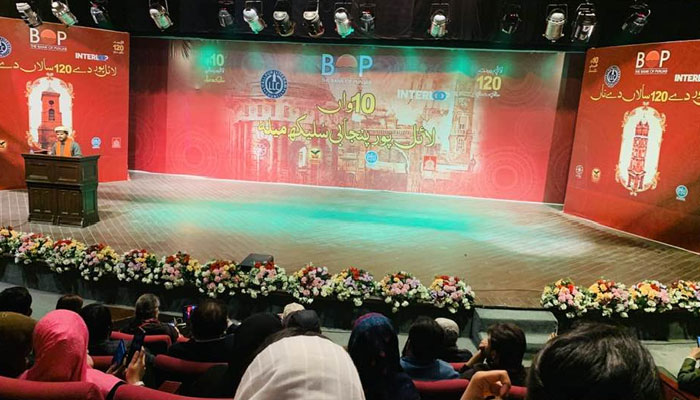Lyallpur festival calls for embracing Punjabi language
Dr Parvez highlights after 1857 rebellion, British authorities systematically destroyed indigenous literary heritage
FAISALABAD: The 10th Lyallpur Punjabi Literary Festival commenced on Sunday evening at Nusrat Fateh Ali Khan Auditorium, bringing together Punjabi writers, researchers and notable figures from across the country and abroad.
During the inaugural session of the two-day festival, keynote speaker Dr. Parvez Wandal emphasized that many contemporary challenges stem from the colonial rule. He highlighted that after the 1857 rebellion, British authorities systematically destroyed indigenous literary heritage.
Dr. Wandal stressed the need to embrace cultural and historical roots to overcome feelings of inferiority about Punjab and its language. He cited the Harappa civilisation as the foundation of Punjab, describing its people as peaceful traders who prioritised social welfare over monumental architecture, leading to centuries of stability and prosperity.
In his address, Musadaq Zulqarnain, President of the Lyallpur Literary Council, stated that the festival has always been deeply connected with the Punjabi language and Lyallpur (Faisalabad).
He emphasized that the council has been organising the Faisalabad Literary Festival for the past decade and last year successfully held the first International Lyallpur History Conference.
He pointed out the issue of linguistic inferiority in Pakistani Punjab, contrasting it with Indian Punjab, where Punjabi is prominently used even in Bollywood films. He attributed the shift towards Urdu among Punjabi-speaking Muslims to historical influences, including British colonial policies and the religious associations of the Gurmukhi script.
The festival’s opening ceremony featured Wajahat Waris singing verses from Waris Shah’s Heer, followed by Dr. Tauheed Ahmed Chatha outlining the festival’s history.
He hailed the event as the largest Punjabi literary festival globally, recognising the contributions of the people of Lyallpur in its decade-long success.
The evening concluded with the launch of the festival’s theme song, sung by Gurpreet Gill, and a storytelling session titled “Kahani Darbar,” featuring narratives from Nain Sukh, Ali Usman Bajwa, Anjum Qureshi, and Naseer Ahmed.
The first day ended with the performance of play Ke Janan Mein Kaun by Azad Theatre. The second day of the festival today, features an extensive line-up of sessions. The day will begin at 11:00am with a discussion on “Lyallpur’s Literary History,” featuring Dr. Anwar Aniq, Dr. Faisal Jappa, Nain Sukh, Dr. Rabia Sarfaraz, Dr. Sameera Akbar and Haitem Tanveer.
Other discussions include “Punjabi Journalism,” “The Need for Punjabi Dictionaries,” and “Libraries and Today’s Punjabi Society,” featuring prominent scholars and researchers.
A documentary screening of Bohe Khulle Rakhein will be followed by a discussion with Dr. Ilyas Chatha and Dr. Ali Usman Qasmi. Additionally, students from Graduate College Muhammad Sharif Chiniot will present a traditional Jhummar performance.
The festival will conclude at 8:00pm with the play Akhiyan by Azad Theatre, marking the end of two days of literary and cultural celebrations dedicated to the promotion of Punjabi language and heritage.
-
 Camila Mendes Reveals How She Prepared For Her Role In 'Idiotka'
Camila Mendes Reveals How She Prepared For Her Role In 'Idiotka' -
 China Confirms Visa-free Travel For UK, Canada Nationals
China Confirms Visa-free Travel For UK, Canada Nationals -
 Inside Sarah Ferguson, Andrew Windsor's Emotional Collapse After Epstein Fallout
Inside Sarah Ferguson, Andrew Windsor's Emotional Collapse After Epstein Fallout -
 Bad Bunny's Star Power Explodes Tourism Searches For His Hometown
Bad Bunny's Star Power Explodes Tourism Searches For His Hometown -
 Jennifer Aniston Gives Peek Into Love Life With Cryptic Snap Of Jim Curtis
Jennifer Aniston Gives Peek Into Love Life With Cryptic Snap Of Jim Curtis -
 Prince Harry Turns Diana Into Content: ‘It Would Have Appalled Her To Be Repackaged For Profit’
Prince Harry Turns Diana Into Content: ‘It Would Have Appalled Her To Be Repackaged For Profit’ -
 Prince William's Love For His Three Children Revealed During Family Crisis
Prince William's Love For His Three Children Revealed During Family Crisis -
 Murder Suspect Kills Himself After Woman Found Dead In Missouri
Murder Suspect Kills Himself After Woman Found Dead In Missouri -
 Sarah Ferguson's Plea To Jeffrey Epstein Exposed In New Files
Sarah Ferguson's Plea To Jeffrey Epstein Exposed In New Files -
 Prince William Prepares For War Against Prince Harry: Nothing Is Off The Table Not Legal Ways Or His Influence
Prince William Prepares For War Against Prince Harry: Nothing Is Off The Table Not Legal Ways Or His Influence -
 'How To Get Away With Murder' Star Karla Souza Is Still Friends With THIS Costar
'How To Get Away With Murder' Star Karla Souza Is Still Friends With THIS Costar -
 Pal Reveals Prince William’s ‘disorienting’ Turmoil Over Kate’s Cancer: ‘You Saw In His Eyes & The Way He Held Himself’
Pal Reveals Prince William’s ‘disorienting’ Turmoil Over Kate’s Cancer: ‘You Saw In His Eyes & The Way He Held Himself’ -
 Poll Reveals Majority Of Americans' Views On Bad Bunny
Poll Reveals Majority Of Americans' Views On Bad Bunny -
 Wiz Khalifa Thanks Aimee Aguilar For 'supporting Though Worst' After Dad's Death
Wiz Khalifa Thanks Aimee Aguilar For 'supporting Though Worst' After Dad's Death -
 Man Convicted After DNA Links Him To 20-year-old Rape Case
Man Convicted After DNA Links Him To 20-year-old Rape Case -
 Royal Expert Shares Update In Kate Middleton's Relationship With Princess Eugenie, Beatrice
Royal Expert Shares Update In Kate Middleton's Relationship With Princess Eugenie, Beatrice




